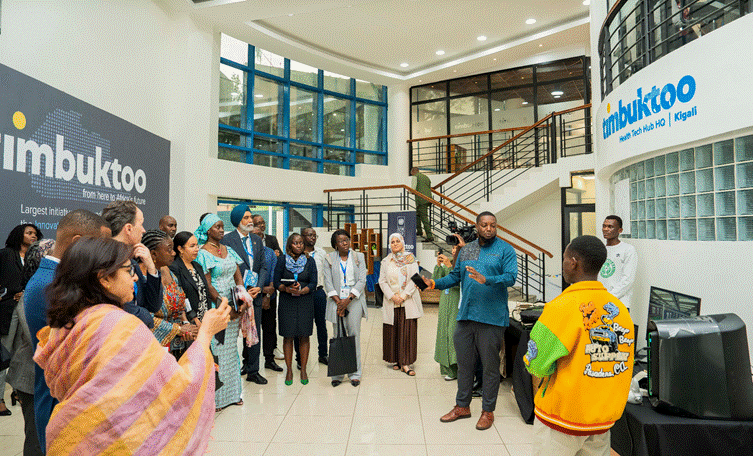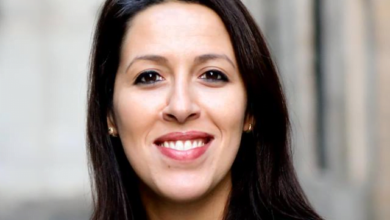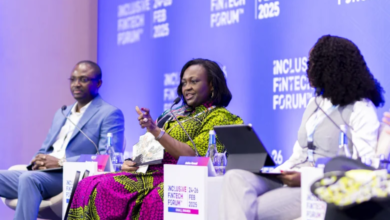Global AI Summit on Africa : Africa joins the global AI conversation
Gathered in Kigali on April 3–4, 2025, for the inaugural Global AI Summit on Africa, over 1,000 policymakers, entrepreneurs, and experts expressed a bold ambition: to make the continent a key player in artificial intelligence. With strategic announcements, strong political messages, and historic partnerships, Africa is determined to catch up and shift from being a passive observer to a driver of the digital revolution.
By Dounia Ben Mohamed, in Kigali
For two days, Kigali became the African capital of artificial intelligence. The Global AI Summit on Africa, held on April 3 and 4, 2025, marked a defining moment for the continent’s aspiration to take a leading role in global AI development. Over 1,000 participants from 45 countries, including heads of state, ministers, researchers, and tech innovators, came together under a common vision: to shape an AI future rooted in African realities.
“Africa must not be just a market for AI but an active player”

From the opening session, Rwandan President Paul Kagame set the tone: “Africa must not be just a market for AI but an active player. To achieve this, we need to build strong infrastructure, train our people, and promote inclusive AI.”
According to the Center for AI and Digital Policy, Africa accounts for just 0.1% of the world’s computing power and less than 5% of its AI talent pool has access to advanced tools. For the continent to thrive in the digital age, bold moves are essential.
One such move is the landmark partnership between Rwanda and the Gates Foundation, which was officially launched during the Summit. The Rwanda Artificial Intelligence Scaling Hub, backed by a $7.5 million commitment over three years, will support the responsible deployment of AI technologies across the continent. “We’re starting with three key sectors: health, agriculture, and education,” said Rwandan Minister Paula Ingabire. “We want to prove that AI can be a tool for social transformation—even in low-resource environments.”
UNDP champions inclusive AI powered by African talent

A vision echoed by international institutions, including the United Nations Development Programme (UNDP), which is working to ensure that the rise of artificial intelligence in Africa remains inclusive, ethical, and anchored in local realities.
Fatmata Sesay, UNDP Resident Representative in Rwanda, emphasized the agency’s priorities: “UNDP is working with governments to support effective AI governance, advance citizen participation in digital policy and develop local expertise in AI technologies and safeguards.”
Jennifer Louie, UNDP AI Trust and Safety Expert, stressed the need for joint action: “There is an urgency needed for collective action to close the AI equity gap through proactive, anticipatory and adaptive measures.”

For Natalie Jabangwe, CEO of timbuktoo Africa, a UNDP initiative that is empowering young entrepreneurs and innovators across the region, Africa’s future lies in its people: “Africa’s greatest selling points are its people, innovative products, and dynamic platforms.” She added: “timbuktoo intends to put the youth at the centre of development and advancement of nascent technologies such as AI, while consistently supporting their innovation and contribution to Africa’s progress.”
On the sidelines of the summit, Amandeep Gill, UN under Secretary-General’s Envoy on Technology, visited the timbuktoo HealthTech Hub in Kigali, where he met young innovators. “By uniting people to address Africa’s key challenges, timbuktoo is proudly upholding the ideals of the UN,” he said. “With platforms such as timbuktoo, and the right policies that safeguard citizen’s rights, AI can be harnessed as a powerful tool to build inclusive and thriving societies.”
The timbuktoo initiative, led by UNDP in collaboration with African governments and the private sector, aims to be the world’s largest program supporting Africa’s innovation ecosystem by empowering young people through tech hubs, entrepreneurship programs, and bridges between startups, investors, and global industry leaders.
Ethics of AI
But the Kigali Summit wasn’t only about tech and infrastructure. It was also a forum for ethical and political reflection. Numerous speakers warned of the dangers of AI trained on datasets that ignore African contexts, potentially reinforcing inequality and bias. “If we don’t write our own algorithms, someone else will—and they’ll embed biases we don’t control,” said Nanjira Sambuli, a Kenyan expert in digital rights and AI governance.
Our youth must be able to develop AI startups, acquire the necessary skills, and build enterprises
The Summit closed with a resounding call for pan-African cooperation and the development of a shared regulatory framework. The African Union has committed to presenting a continental charter on AI before the end of the year. “Our youth must be able to develop AI startups, acquire the necessary skills, and build enterprises. The African continent must move forward in adopting development policies, particularly regarding AI, with the resources available,,” urged Mahamoud Ali Youssouf, Chairperson of the African Union Commission (AUC).






